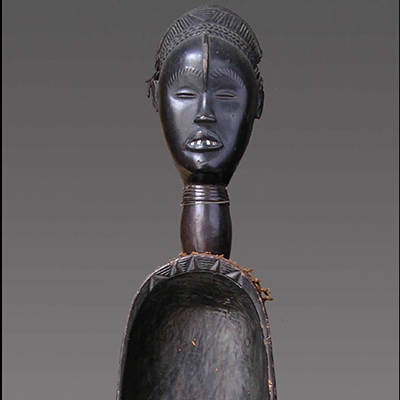
Liberia, 1931-33: The Collections of Alfred J. Tulk
Bellarmine Hall Galleries
September 14 – December 14, 2018
Many important collections of West African art trace their origins to the state of Connecticut. This exhibition highlights objects acquired in the early 1930s by Connecticut artist Alfred James Tulk of Stamford.
Born in London in 1899, Alfred Tulk studied art at Oberlin Art College and then Yale University, from where he earned his BA in 1923. Tulk is best known for his public mural paintings, stained glass windows, and mosaics, many of which he completed during his tenure at the Rambusch Decorating Company in New York City. Between 1925 and 1954, he painted over 300 large murals for theatres, churches, hotels, restaurants, and private homes in the United States.
In 1931, Alfred Tulk and his wife, Ethel Tulk, traveled from their home in Connecticut to rural Liberia, where they spent one year living and working in Ganta at the American Methodist mission station established there in 1926 by Tulk's close friend, medical missionary Dr. George W. Harley. While in Liberia, Tulk assembled a small but important collection of masks, statues, and other objects of daily use and material culture a number of which have been re-assembled for this exhibition. He also created a portfolio of portrait drawings and oil paintings which he created in situ of local subjects from the region around Ganta. The exhibition will include several of Tulk's own artworks, as well as some of his field photographs, his map of Liberia, selected correspondence, and a copy of his original handwritten field diary.
While focusing on Alfred J. Tulk as collector, the exhibition also seeks to contextualize the objects he acquired within the cultural context of their origin and use. Associated both with ritual functions and daily activities, these objects provide a unique lens onto the cultures of northeastern Liberia during the early decades of the twentieth century. Because Tulk brought back a mix of both "authentic" and "trade/tourist" art, the collection allows us to explore in the exhibition narrative issues such as commodification and the art market, the changing socio-economic landscape of rural Liberia in the early twentieth century, and the adoption of new materials (such as aluminum) in "traditional" aesthetic forms.
The exhibition is curated by Dr. Christopher B. Steiner, Lucy C. McDannel '22 Professor of Art History and Anthropology at Connecticut College, and will include works lent by The Museum of Fine Arts, Boston, The Peabody Museum of Archaeology & Ethnology of Harvard University, the collection of Louis T. Wells, and other private collections.